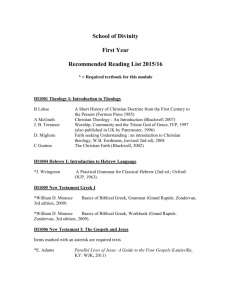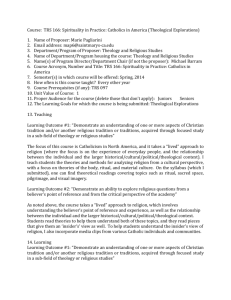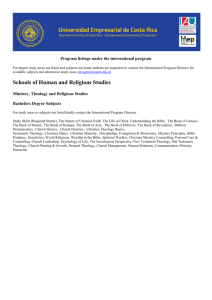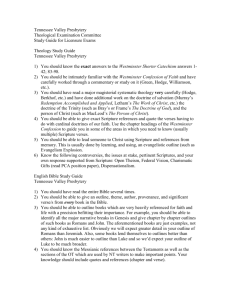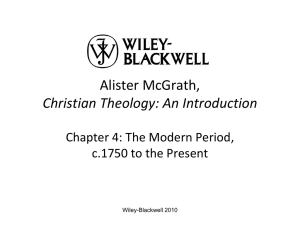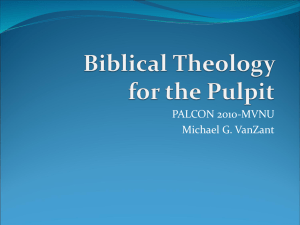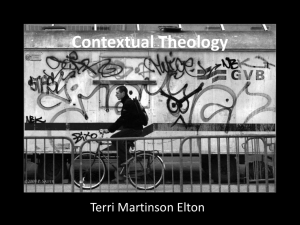Alister McGrath, Christian Theology: An Introduction
advertisement
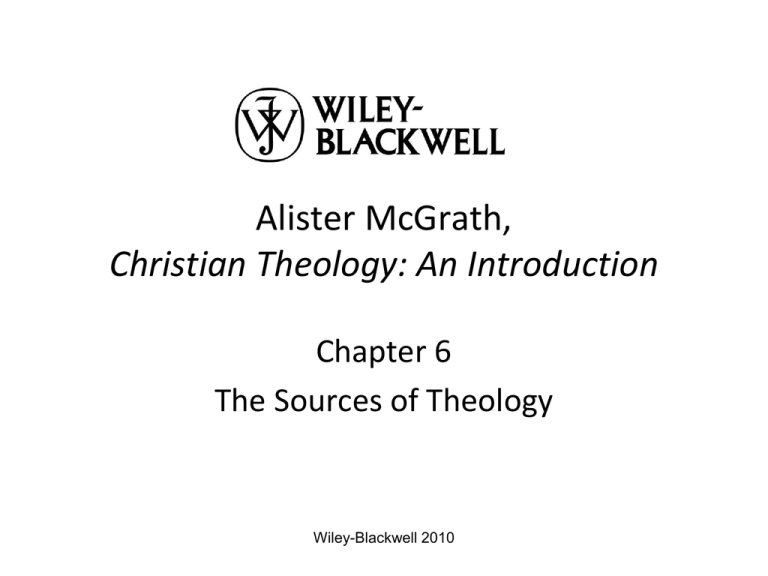
Alister McGrath, Christian Theology: An Introduction Chapter 6 The Sources of Theology Wiley-Blackwell 2010 Scripture • The Old Testament – The Hebrew Bible – The First Testament – Tanakh (law, prophet, and writings) • The New Testament – – – – Gospels Acts Letters (epistles) Revelation • Other works: deutero-canonical and apocryphal writings – Distinction between Old Testament and Apocrypha – Canon and authority Wiley-Blackwell 2010 • The relation of the Old and New Testaments – – – – – Theological principles and ideas v. cultic practices Marcion Martin Luther John Calvin Second Vatican Council • The canon of Scripture: historical and theological issues – Historical issues • Consensus • Disputes – Theological issues • The church has authority over Scripture • Scripture has authority over the church • The church and Bible belong together Wiley-Blackwell 2010 • The Word of God – Jesus Christ (God incarnate) – The gospel of Christ – The Bible • Narrative theology – – – – Narrative as main literary type in Scripture Avoids abstraction Affirmation that God meets us in history Tension between limited human characters and God’s omniscience • Methods of interpretation of Scripture – Alexandrian school • Allegory – Antiochene school • Historical context Wiley-Blackwell 2010 – Western church • Ambrose of Milan • Augustine of Hippo • Typology – Middle Ages • • • • Literal sense Allegorical sense Tropological or moral sense Anagogical sense – Reformation • Erasmus • Huldrych Zwingli – Enlightenment • • • • Rational approach Historical approach Sociological approach Literary approach – Liberation theology Wiley-Blackwell 2010 • Theories of the inspiration of Scripture – 2 Timothy 3:16-17 – John Calvin • Doctrine of accommodation – 1994 Catechism of the Catholic Church – Enlightenment • Johann Gottfried Herder • Charles Hodge and Benjamin B. Warfield • Subjective understanding of inspiration (Augustus H. Strong) Wiley-Blackwell 2010 Tradition • In the New Testament • Irenaeus and Gnosticism • Vincent of Lérins – Universality, antiquity, consensus • Johann Adam Möhler • Tradition and traditionalism – Catechism of the Catholic Church (1944) – John Meyendorff, Living Tradition • • • • A single-source theory of tradition A dual-source theory of tradition Total rejection of tradition Theology and worship: the importance of liturgical tradition – Lex orandi, lex credendi – Gnosticism and ArianismWiley-Blackwell 2010 Reason • Reason and revelation: three models – Theology is a rational discipline – Theology “republishes” the insights of reason – Theology is redundant; reason reigns supreme • Deism – “The Age of Reason” – John Locke, Essay Concerning Human Understanding – Matthew Tindal, Christianity as Old as Creation • Enlightenment rationalism – Christian Wolff, Reasonable Thoughts about God, the World, the Human Soul, and just about everything else – Reason v. rationalism • Criticisms of Enlightenment rationalism – Alasdair MacIntyre, Whose Justice? Which Rationality? Wiley-Blackwell 2010 Experience • Religious experience – The Wesleyan quadrilateral – William James, The Varieties of Religious Experience • • • • Ineffability Noetic quality Transciency Passivity • Existentialism: a philosophy of human experience – Søren Kierkegaard (1813-55) – Martin Heidegger (1888-1976), Being and Time – Rudolf Bultmann and New Testament studies • Experience and theology: two approaches – Experience as the basis for theology • Paul Tillich (1886-1965), The Courage to Be – Theology as the interpreter of Scripture • Augustine • C.S. Lewis (1898-1963) • Ludwig Feuerbach’s critique of experience-based theologies Wiley-Blackwell 2010
